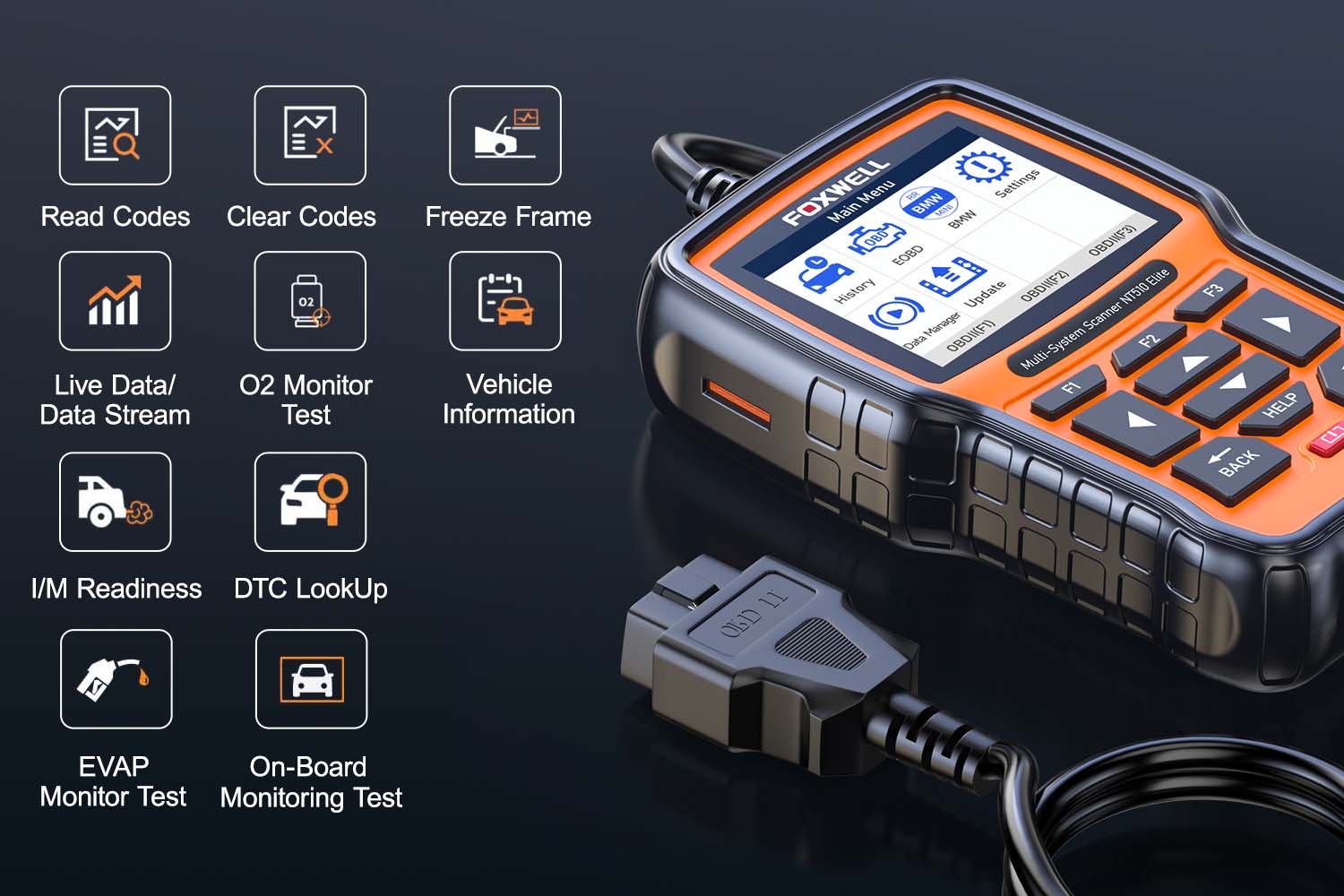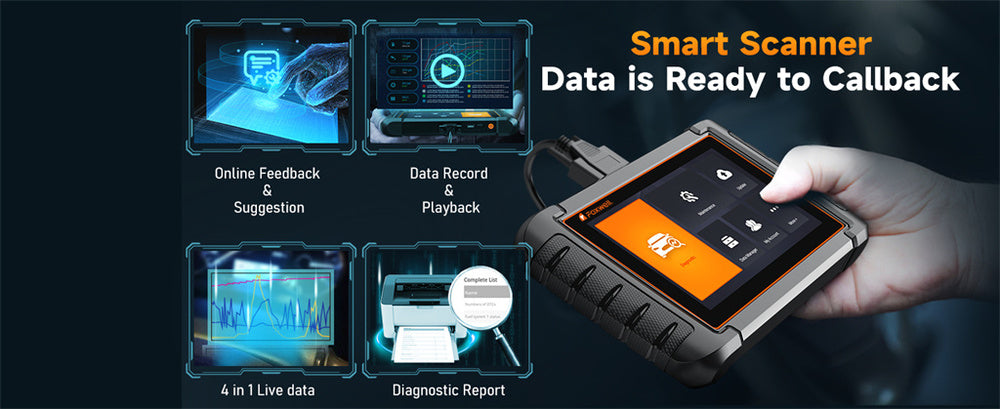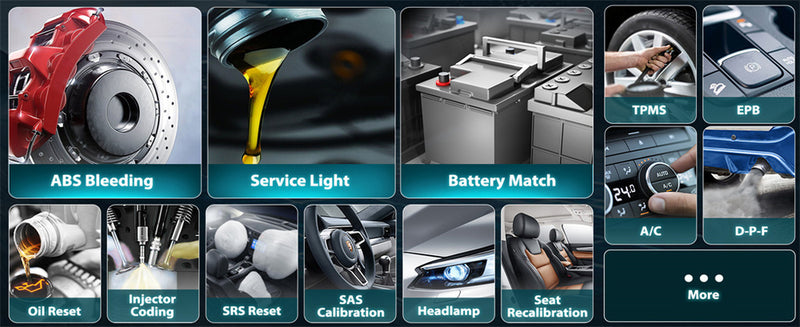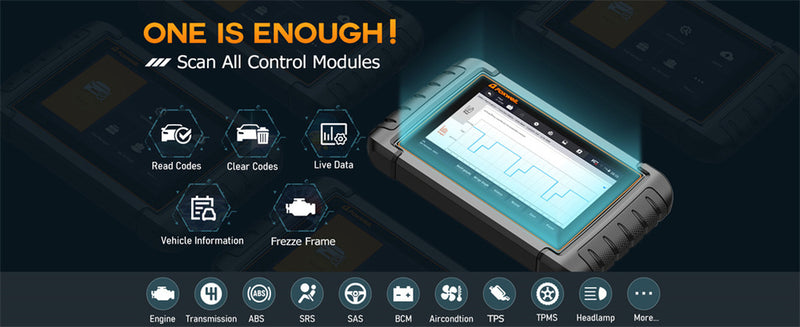When it comes to maintaining your vehicle, understanding its health and pinpointing issues before they become serious problems is crucial. This is where a car code scanner comes in handy.
By allowing you to diagnose automotive troubles with precision, a code scanner can save you time and money.

What to Look for When Selecting a Car Code Scanner
When selecting a car code scanner, several vital considerations ensure you purchase an effective tool that meets all your needs.
Here is an outline of what to look for when purchasing one:
Compatibility
Before purchasing your scanner, make sure it will work with your vehicle's make, model, and year.
Different scanners vary greatly in their compatibility depending on their manufacturer and the protocols they support.
Most modern scanners should support OBD2, which has become standard across most cars sold since 1996; however, if you own an older classic car, then a scanner that supports older OBD1 systems might be needed instead.
Features
Code scanners range from basic models that simply read and clear codes to more complex units offering extensive diagnostics such as real-time streaming of live data streams, freeze frame data storage capabilities and the capability of suggesting possible fixes.
Here are some advanced features you should keep in mind:
Live Data Monitoring: Provides real-time monitoring of various systems within your vehicle.
ABS/SRS Capabilities: Some scanners can diagnose issues related to anti-lock braking and airbag systems.
Transmission Diagnostics: High-end scanners can read and reset transmission codes on vehicles with automatic transmission issues, providing critical insight.
Ease of Use
The user interface is another essential factor.
A good scanner should have an intuitive, clear display with intuitive controls that make navigation straightforward.
Touchscreen interfaces increase usability, while an organized menu system helps avoid confusion during the diagnostic process.
Also consider scanners that offer support or access to databases with definitions and potential troubleshooting steps for better diagnosis.
Price
Price can be an essential consideration and varies widely between models. Basic scanners may cost as little as $20-$50, while more sophisticated systems could run several hundred dollars.
Consider your usage needs carefully when making this decision; casual users may only require some advanced features in professional mechanics' tools.
Considered both Software Updates and Support
Regular software updates from your scanner manufacturer can ensure compatibility with newer vehicle models and alert you to new error codes.
Furthermore, great customer support can help you understand complex codes or deal with hardware issues.
Durability
Professionals or those intending to use their scanners often should prioritize durability when selecting a scanner.
Look for one made with robust materials that can withstand bumps and drops, such as those designed with protective cases or rugged designs made to stand up against harsh environments.
Before selecting a car code scanner, assess your specific needs and budget before considering which features align with your typical maintenance practices.
Finding an effective scanner not only simplifies diagnostic tasks but can also extend its life by enabling timely repairs and maintenance.
Top Recommended Car Code Scanners
When selecting the appropriate car code scanners for you and your needs, there are various factors that you must keep in mind when making a selection decision:
Entry-Level Scanners: Code readers are often enough for basic diagnostic needs. These devices allow users to quickly read and clear engine control unit (ECU) codes and are usually very cost-effective.
Professional-Grade Scanners: For advanced diagnostics, professional-grade scanners provide extensive functionality.
These tools can read an array of codes, provide real-time data streams, and program ECUs; these comprehensive devices make diagnosis more accessible than ever.
Innovative Features in New Models: Recent scanner models like the Foxwell NT710 stand out due to their cutting-edge features.
This device stands out with its specialization in transmission issues, making it an excellent choice for performing detailed checks on automatic transmissions.
It offers robust functions, including reading and clearing transmission trouble codes and monitoring real-time transmission health status data.
This scanner is ideal for automotive enthusiasts and professional mechanics alike. Its ease of use and deep diagnostic capabilities allow for proactive management of car health.
How to Effectively Utilize a Code Scanner
Employing an effective car code scanner is critical to accurately diagnosing any issue on the car and saving both time and resources on false diagnoses.
Here is a detailed guide on how to use it efficiently:
Locate OBD2 Port: This port can usually be found underneath the dashboard near the steering wheel; however, its exact location will depend on your car's make and model. Referring to your owner manual may help if necessary.
Connect the Scanner: Plugging your code scanner securely into the OBD2 port will help ensure any transmission data transmission errors are avoided.
Starting the Vehicle: For optimal operation of most scanners, an engine must be running to perform any checks properly, though preliminary checks could still be completed with just the ignition turned "on".
Navigation of Scanner Menus: Use your scanner's interface to choose what type of data or diagnostics you wish to perform, such as reading/clearing diagnostic trouble codes, viewing freeze frame data or checking real-time parameters.
Interpret the Codes: Once a scan has been completed, the device will display any collected diagnostic trouble codes.
These alphanumeric DTCs can then be referenced against your manual or an online database to interpret their meaning.
Based on the codes and their meaning, do further troubleshooting or visit a professional mechanic if repairs exceed your skill set.
After diagnosing and correcting the issue, use your scanner to clear the codes. This will turn off the check engine light and reset system monitors to their default state.
Tips for Effective Use
Regular Updates: Ensure your scanner's software remains up-to-date to remain compatible with newer vehicles and incorporate any fixes or features released by its manufacturer.
Keep a Record: Always maintain a log of the codes you retrieve and their dates of acquisition. This can help you track recurring issues or serve as valuable records for mechanics.
Understand Your Limits: Although code scanners are powerful diagnostic tools, not all vehicle issues trigger diagnostic trouble codes—mechanical issues, for instance, could go undetected.
Add Supplementary Tools: For comprehensive diagnostics, combine your scanner with additional tools like a multimeter or vehicle-specific repair manuals to provide context or expand upon diagnostic capabilities.
Common Issues and Troubleshooting
Scanner Not Recognizing Vehicle: Make sure your scanner is compatible with your car's make and model, check for loose connections, and ensure the ignition switch is in the appropriate position.
Error Codes Will Not Clear: Some issues require multiple drive cycles before clearing, or there may still be unresolved problems preventing the system from resetting.
Accurate Readings: Ensure your scanner's software is up-to-date to prevent inaccurate readings caused by low car batteries or other electrical issues. Inaccurate readings could also indicate low power or other electrical problems with the scanner.

Conclusion
Car code scanners are essential tools in modern vehicle maintenance, helping ensure your car remains in top shape while preventing costly repairs later on.
From entry-level models like the Foxwell NT710 to more sophisticated options such as the Foxwell NT706, selecting one that meets your specific needs and budget is the key to keeping your car on the road in top condition.But be careful that it matches your car's make and model.
FAQs
Can I use any code scanner on my car?
Not necessarily. Ensure the scanner is compatible with your car’s make and model.
Does the engine need to be running when using a code scanner?
Yes, for full diagnostics. For basic checks, turning on the ignition alone often suffices.
Will using a code scanner void my car warranty?
No, using a code scanner does not void your car's warranty.





Leave a comment
This site is protected by hCaptcha and the hCaptcha Privacy Policy and Terms of Service apply.